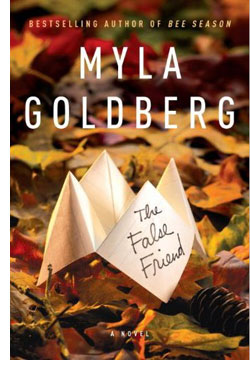 |
 |
 Myla Goldberg
Myla Goldberg
The False Friend
Reviewed by: Rick Kleffel © 2010
Doubleday / Random House
USA Trade Hardcover, First Edition
ISBN 978-0-385-52721-7
Publication Date: 10-05-2010
272 pages, $25.95
Date Reviewed: 11-05-2010
Index:
General Fiction
Mystery
Celia Durst is walking down the street in Chicago, when, upon seeing a vintage VW beetle, she hears her best friend Djuna say, "Ladybug." But it must be a memory. Djuna disappeared twenty-one years ago, when, at the age of eleven, she stepped into a stranger's car and was never seen again. At least, that's the lie that Celia told. The lie that everyone believed.
From the first sentence to the final page, Myla Goldberg's 'The False Friend' (Doubleday / Random House ; October 5, 2010 ; $25.95) is an exercise in splintered vision and suspense. Celia Durst is a thirty-two year-old woman with a nice boyfriend named Huck, two dogs, and a past that has refused to remain in the past. The events that marked her at the edge of adolescence have not left her alone. The stories she told have not ended and the young girl that she remembers being may not have been who she was.
Goldberg's novel is a trimmed down and focused exploration of lives of young girls, just before they reach adolescence, a story of memory, lies and regret. As we meet Celia Durst, she seems to be a capable, professional woman, with a good job, a solid relationship and a life right on track. But as she drops everything to return home and undo the lie she told others, we begin to learn — she begins to learn — that her identity, her sense of self, may be based on lies she told herself.
Goldberg carefully crafts a story of suspense and character revelation, by way of examining the traumas children so easily inflict on one another. The author deftly weaves the past and present, threading us through memories and stories as Celia speaks to — or tries to speak to — her friends from so long ago. What emerges is a scary and tense set of conflicting stories of pre-teen bullying and revenge. As Celia immerses herself in her own past, the reader experiences stories and memories, first-hand and third-hand — of the cruelty with which these girls treat one another. They have a cavalier sense of hurt. They're capable of inflicting pain for the fun of it, and unaware of how it feels to be on the receiving end.
Goldberg paces her novel expertly, interlacing memory, storytelling and re-unions. Every conversation is laden with revelation, with stories that conflict one another and memories that may or may not be real. Goldberg creates a convincing vision of suburban decline, of lives spiraling into nowhere as Celia tries to find who she was in the past — and what that implies about her self in the present.
'The False Friend' is a very tightly-woven novel, with not a word to spare. The suspense from page to page, from lie to memory, from conversation to revelation is intense but never over-played. As the novel unfolds, readers will realize that their memories of the book are suspect as well, that the stories we read and the stories we tell ourselves, and others, can easily trap us. Our memories are pegged to stories, to lies, to narratives that fit our preconceptions but may not fit the facts. We read 'The False Friend' immersed in the power of the lies that control our lives, the stories that seem so friendly, yet prove to be so false.
|
 |
|
|
 |
| |
Review Archive
All Reviews alphabetized by author.
General Fiction
Non-Genre, general fiction and literature.
Horror
Supernatural fiction, supernatural horror and non-supernatural horror.
Science Fiction
Science fiction, science fantasy, speculative fiction, alternate history.
Fantasy
Fantasy, surrealism and magic realism.
Mystery
Crime, thrillers, mystery, suspense.
Non-Fiction
Non-Fiction, True Crime, Forteana, Reference.
Poetry
|
|
 |
|




